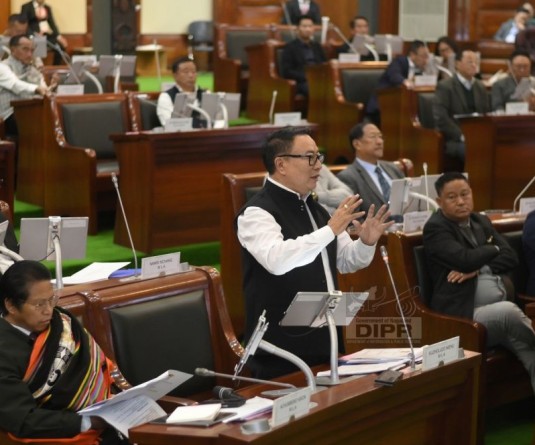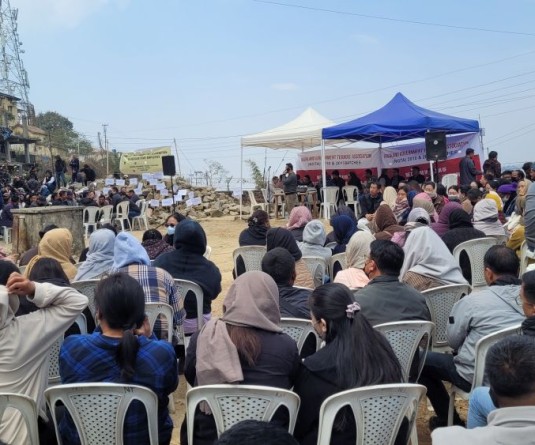
DIMAPUR, JULY 15 (MExN): Only two years old, Green-SONS (Green Succession of Nagaland State), a voluntary environment protection group is gradually pushing a movement to make Nagaland more environment-conscious. To realize this objective Green-SONS has been unwaveringly promoting green activities the past two years.
On Friday, July 15, the group launched a signature campaign to create awareness on protection and conservation of the precious flora and fauna of the state. The campaign’s slogan reads: ‘To promote cleaner environment and ecological balance’. Commemorating the launch, a programme was held today at Hotel Saramati, Dimapur.
T.A.P Paul, advisor, Green-SONS declared the campaign open in the presence of representatives from the department of Forests & Wildlife. Forest ranger, Wildlife wing of Dimapur division Athrise Sangtam spoke on the importance of flora and fauna.
‘To promote cleaner environment and ecological balance’
Green-SONS founder and chairman Jess T Murry informed that the campaign will tour all the districts of the state starting today and will continue for the rest of the year. Murry sought the cooperation of all, particularly the high ranking officials as well as the legislators, in making it a success. He emphasized that they are not forcing anyone whatsoever to join the campaign, rather cooperation born out of concern for the environment and the flora and fauna. “We want to preserve our forests and the life supported by it” from becoming extinct.
“As a nascent organization, we’re trying our best to protect the environment”, said TAP Paul. Raising some immediate ecological concerns facing the state today, Paul mentioned the unchecked oil-spill at Champang in Wokha district, the landslides aided by deforestation and the floods in Dimapur. Economic development must come, he said but not at the cost of completely destroying the frail ecological balance. Effort must also be concentrated at replenishing the forest wealth, he added.
Murry also brought to attention the dangers of ‘bio-piracy’ which is defined as the theft of a region’s bio-resources, especially medicinal plants and other biological resources by foreign elements. It is a problem faced by many developing countries of the world. Hence, he appealed to the department of Forests to strictly monitor this practice.
On Friday, July 15, the group launched a signature campaign to create awareness on protection and conservation of the precious flora and fauna of the state. The campaign’s slogan reads: ‘To promote cleaner environment and ecological balance’. Commemorating the launch, a programme was held today at Hotel Saramati, Dimapur.
T.A.P Paul, advisor, Green-SONS declared the campaign open in the presence of representatives from the department of Forests & Wildlife. Forest ranger, Wildlife wing of Dimapur division Athrise Sangtam spoke on the importance of flora and fauna.
‘To promote cleaner environment and ecological balance’
Green-SONS founder and chairman Jess T Murry informed that the campaign will tour all the districts of the state starting today and will continue for the rest of the year. Murry sought the cooperation of all, particularly the high ranking officials as well as the legislators, in making it a success. He emphasized that they are not forcing anyone whatsoever to join the campaign, rather cooperation born out of concern for the environment and the flora and fauna. “We want to preserve our forests and the life supported by it” from becoming extinct.
“As a nascent organization, we’re trying our best to protect the environment”, said TAP Paul. Raising some immediate ecological concerns facing the state today, Paul mentioned the unchecked oil-spill at Champang in Wokha district, the landslides aided by deforestation and the floods in Dimapur. Economic development must come, he said but not at the cost of completely destroying the frail ecological balance. Effort must also be concentrated at replenishing the forest wealth, he added.
Murry also brought to attention the dangers of ‘bio-piracy’ which is defined as the theft of a region’s bio-resources, especially medicinal plants and other biological resources by foreign elements. It is a problem faced by many developing countries of the world. Hence, he appealed to the department of Forests to strictly monitor this practice.






